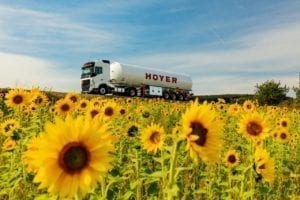
Source: Hoyer Group
The market for alternative energies is growing rapidly worldwide. This trend has prompted the Hoyer Group (Hamburg, Germany) to strategically strengthen its liquefied natural gas (LNG) transport business area. For the logistics specialist, natural gas liquefied under pressure or cryogenically also has big potential as a fuel. The company gains increased momentum by using LNG-fuelled trucks for road transport operations.
Growth in the need for LNG for road transport, industry and shipping is becoming noticeable as an increased demand for logistics solutions. The Hoyer Group notes these market changes and responds by accelerating the LNG transport business. The portfolio of services in this segment includes customized transport services and logistics concepts for three business areas — supplies to petrol stations and deliveries to industrial companies. A further pillar is supply to shipping.
Ortwin Nast, CEO of the Hoyer Group, says “We can make use of many years of experience in transporting and handling industrial, chemical and special gases, and we have equally long expertise in supplying mineral oil. The fact that we bring gases liquefied under pressure and cryogenically safely to their destination every day is particularly due to our optimally trained drivers and dispatchers.”
The logistics specialist relies on weight-optimized, state-of-the-art equipment for maximum safety and economic efficiency. The Hoyer Group has a variety of road tanker types purely for road transport. To supplement these, the fleet also comprises various different tank container sizes that are used to transport LNG. The available options include 20-foot, 40-foot and 45-foot tank containers. The majority of both the tank containers and road tankers are equipped with a pump and measuring section. The pump has a high delivery pressure for quick unloading. The measuring section allows the amount of product unloaded to be accurately measured.
All of the Hoyer Group’s equipment has the necessary approvals entitling the company to load at major European LNG storage terminals. The Hoyer Group transports LNG in tank containers worldwide. The majority is moved in intermodal traffic.
LNG plays a twofold role for the Hoyer Group: with a view to the future, the use of alternative drive systems is increasing, which sends a clear message about climate protection. For this purpose, the company is successively expanding its fleet by including LNG trucks, as well as compressed natural gas (CNG) vehicles. Hoyer has already put four LNG trucks and seven CNG vehicles on the road. Nast says “As gas transport experts, we ensure the safe transport of all kinds of gases on a daily basis. Expanding our truck fleet by including climate-friendly trucks is a logical consequence, and emphasizes the values of the Hoyer Group.”
Engines that are fueled with liquid natural gas emit around 15% less CO2 emissions and approximately 60% less oxides of nitrogen (NOx) compared to conventional diesel engines. An LNG engine also consumes less fuel. The topic of alternative drive systems will be followed up intensively in the future. Steady expansion of the service station infrastructure, together with attractive measures such as exempting LNG trucks from highway tolls reinforces the trend towards LNG trucks, despite higher acquisition costs compared to their diesel equivalents.
The personnel of Hoyer is a very significant factor when transporting this highly sensitive product. To guarantee the safety of people and the environment, regular safety and driving training sessions, which more than fulfill statutorily prescribed requirements, are on the agenda. The latest training methods and technologies are used for this purpose. The Hoyer Group considers itself to be the industry leader in relation to driver training. Working conditions and employee safety undergo constant further improvement to ensure Hoyer is an attractive employer and to promote the profession of truck driver in the future as well.